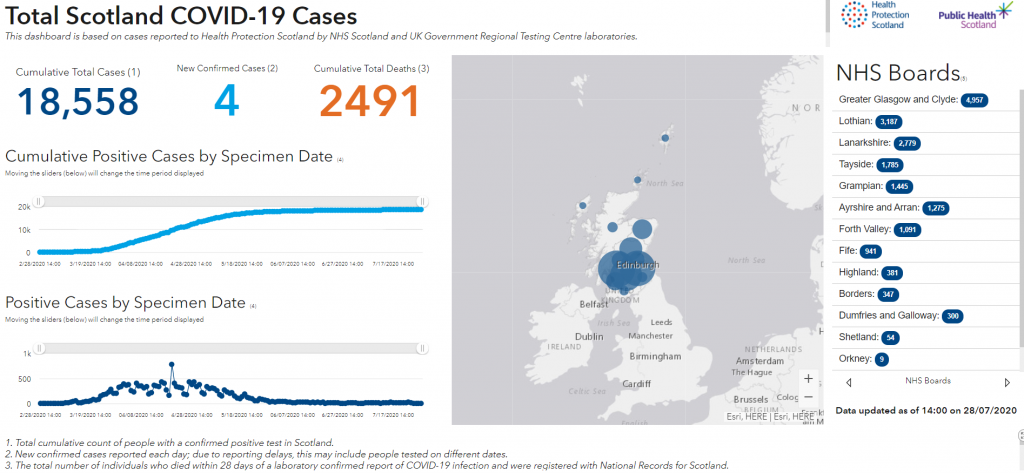As a Public Health Scotland (PHS) information analyst, I’ve had a front row seat to the data and intelligence response from our organisation to keep the public, leaders in government and the health service informed on the latest progress of the Covid-19 pandemic.
Before Covid-19, we were delighted with a few hundred views of a yearly, quarterly or monthly publication. Today, I note down over 80,000 views of our Covid-19 daily dashboard in the last 24 hours and similar high level traffic (downloads and API calls) to the associated Open Data.
Who is using the data?
NHS Scotland, BBC News, the University of Edinburgh, the University of Glasgow, Biomathematics & Statistics Scotland, Scottish Water, Public Health England, and Travelling Tabby… and many more including your family and friends.
Covid-19 has changed everything
At the start of the pandemic there was huge demand from citizens and professionals for timely, robust and clear information. A handful of information analysts and healthcare scientists quickly learned a new dataset and developed the methodologies and code to allow Public Health Scotland to routinely publish Covid-19 statistics, 7 days a week.
See below our first daily dashboard iteration was in Arc GIS reporting on positive cases and deaths.

Innovation and collaboration
Through rapid agile development we released a number of iterations to the daily dashboard over an 18-month period. This provided users with more breakdowns and new measures.
- Testing data
- Hospital and ICU admissions
- Cases by Neighbourhood
- Vaccinations
- Combined PCR & LFD Cases
What Public Health Scotland has been up to
During this time we also had to advance and modernise our data infrastructure to deal with the rapid increase in volumes of testing that were impacting on our ability to generate daily reports on time.
We built in automation using R, an open source statistical program and language. Of the many achievements along the way, developing automation scripts had the biggest impact for my team freeing up more of their time to seek out personal development and add more variety to their work by getting involved in other projects across the Covid Data & Analytics service.
The PHS Covid-19 daily dashboard has been a consistent and transparent source of information reinforcing public health messaging throughout the pandemic. We have had to balance confidentiality, misinterpretation and the potential for unintended consequences on behaviours from our reporting.
Despite the challenges, public engagement with our data has been fantastic, boosted by mentions from the First Minister and used by journalists online and on social media. Positive feedback and examples of personal stories on how the dashboard is being utilised, for example from the shielding population, give us a nice reminder of why it is so important to deliver valuable information.
We participated in a World Health Organisation study of Covid-19 dashboards and on the Microsoft Teams call our director at the time reflected on our journey to date:
We were building the plane as we were flying it
This appropriately captured the reactive nature of our developments, the uncertainty of the rapid developing situation but also that we were successfully delivering what was required.
There has been tremendous cross organisation collaboration to deliver the data and intelligence for Scotland during these unprecedented times. I’ve yet to decide whether my colleagues have risen to the challenge out of a sense of public health duty, insanity or because of the culture we promote and the great people we work with. Some of each perhaps and it is much appreciated!
Variety is the spice…
As an information analyst, I can go from having my headphones in and 2 computer screens that look like a scene from the matrix (I like my coding environment dark theme) to presenting our latest developments to the Cabinet Secretary for Health & Social Care, the Chief Medical Officer, NHS Board clinicians or Public Health advisors.
After 11 years as an analyst in NHS/Public Health my career continues to be rewarding and presents new exciting opportunities. If there was ever a time to be involved with contributing to a Scotland where everybody thrives then that time is now.
Graham McGowan is the principal information analyst at Public Health Scotland
This piece was originally published on The Data Lab’s blog.